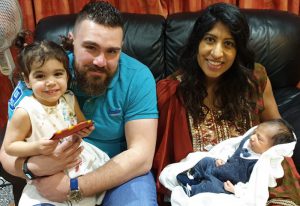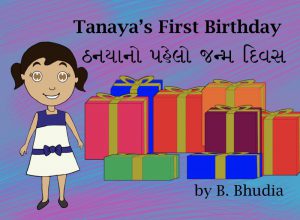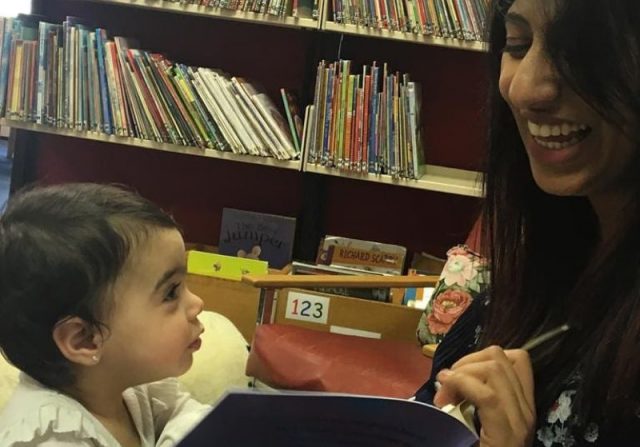Growing up in a multicultural, multiethnic, and multilingual London has been a key factor in shaping my identity. I am British – born and bred. A true Londoner. And I am as Indian as they come.
My childhood was an Indian one, from the food, the language, the weekend activities, to the way I interact with people; my experiences have all been influenced by the attitudes and values my parents brought over from South Asia. Yet, all of these aspects of my identity have also flourished in the midst of a forward-thinking city, amongst a sea of people; some who look like me, and some who look nothing like me, in every shade, shape, and size there is.
 I am fortunate to be in this position. My identity is firmly rooted in the culture and language that shaped it. But it was only when I became a mother that I became aware of the fragility of my mother tongue. This language – an integral part of my heritage and identity – may gradually dwindle and dissolve as the generations drift further from those roots.
I am fortunate to be in this position. My identity is firmly rooted in the culture and language that shaped it. But it was only when I became a mother that I became aware of the fragility of my mother tongue. This language – an integral part of my heritage and identity – may gradually dwindle and dissolve as the generations drift further from those roots.
Yes, I speak Gujarati, and yes I eat Gujarati food and wear Gujarati clothes, but the reality of the situation is that now, as an adult, my parents and their generation speak Gujarati, but I answer in English.
Yes, I know the vocabulary but the nuances of the language are lost on me. I would struggle to understand a joke based on wordplay and I wouldn’t stand a chance telling one. I can read its written form and recognise the letters but the fluency is dying. If this is the pattern emerging in my family and if it’s the same for others in similar situations to me, the language, at least in the UK, will die out. Following that it’s easy to imagine the traditions that have been treasured for generations will follow close behind.
It was this, combined with the fact that my children are mixed race which essentially means the identity I pass on will be halved, that motivated the creation of my bilingual book series. I want to keep Gujarati ingrained in them, in a way that would go beyond just the presence of my parents and even me.
 The debut book, “Tanaya’s First Birthday” teaches children about colours and toys in both Gujarati and English. “Tanaya Goes on Safari” teaches the names of animals and numbers. The idea was that the vocabulary and sentence structures are taught to them in a simple and fun way. The Gujarati can be read in parallel with the English so children learn through direct translation and the sounds and patterns are familiar to their ears. Or it can be read solely in either language where the associations are made through the illustrations. A pronunciation guide in English has been added to the later publications to assist. Either way, it provides a way to actively and effortlessly include Gujarati in the home where it may not be generally spoken.
The debut book, “Tanaya’s First Birthday” teaches children about colours and toys in both Gujarati and English. “Tanaya Goes on Safari” teaches the names of animals and numbers. The idea was that the vocabulary and sentence structures are taught to them in a simple and fun way. The Gujarati can be read in parallel with the English so children learn through direct translation and the sounds and patterns are familiar to their ears. Or it can be read solely in either language where the associations are made through the illustrations. A pronunciation guide in English has been added to the later publications to assist. Either way, it provides a way to actively and effortlessly include Gujarati in the home where it may not be generally spoken.
My identity as an Indian, Gujarati woman is fundamental to me – it is one of the things that defines me – and I refuse to sit on the sidelines and let that slip away from my children and future generations. It is called the mother tongue for a reason!
Tanaya Goes on Safari
ISBN: 9781699757970
Tanaya’s First Birthday
ISBN: 9781726741187

Bhamika Bhudia
Bhamika Bhudia is an English teacher at a comprehensive secondary school in the UK. She is bilingual and of Gujarati heritage and she puts her professional knowledge of child language acquisition into the construction of her books to help a generation learn and retain their root language.

![Powerful Pride documentary Legendary Children [All Of Them Queer] streaming very soon](https://globalindianstories.org/wp-content/uploads/2025/06/Legendary-streaming-release-featured-238x178.jpg)



![Powerful Pride documentary Legendary Children [All Of Them Queer] streaming very soon](https://globalindianstories.org/wp-content/uploads/2025/06/Legendary-streaming-release-featured-100x75.jpg)

